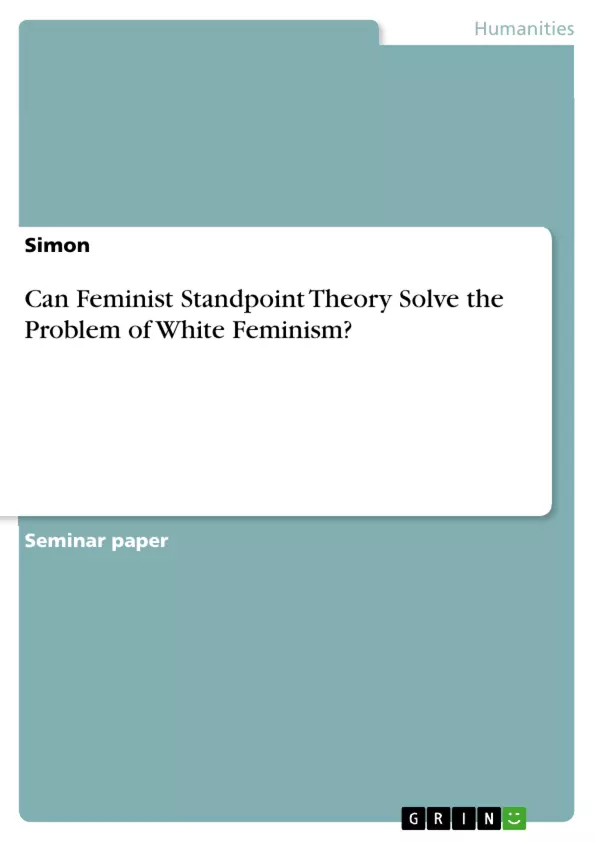In contemporary feminist discourse the issue of "white feminism" has emerged as a significant challenge. This term encapsulates a set of ideologies and practices within feminism that prioritize the concerns and experiences of white women while marginalizing or ignoring those of women of color. As feminism strives for inclusivity and intersectionality, the persistence of white feminism raises critical questions about the effectiveness of feminist theory and feminist research methodology in addressing the diverse needs, experiences and perspectives of all women.
The aim of this paper is to answer the question already posed in the title: Can feminist standpoint theory solve the problem of white feminism? That is to say that the central inquiry is whether feminist standpoint theory offers a framework capable of rectifying the limitations and exclusions inherent in the social sciences due to white feminism. To this end, this paper begins by delineating the concept of white feminism and examining why it poses a problem within feminist theory. Additionally, the first chapter provides a short overview of the seminal theory of intersectionality, which are integral to understanding the complexities of oppression and privilege within feminist movements.
The second chapter delves into feminist standpoint theory, elucidating its conceptual underpinnings. By dissecting the nuances of feminist standpoint theory, including the diverse approaches proposed by theorists like Susan Harding and Alison Wylie as interpreted by Sharon Crasnow, this chapter aims to lay the groundwork for understanding how standpoint epistemology might offer insights into addressing the problems of white feminism.
Finally, the paper's focal point will be the examination of the relationship between white feminism and feminist standpoint theory. Through a critical analysis various facets of white feminism are compared and contrasted with feminist standpoint theory to evaluate its efficacy in addressing these concerns and offering a holistic framework for embracing the viewpoints of all women.
Inhaltsverzeichnis (Table of Contents)
- Introduction
- White Feminism
- Intersectionality
- Feminist Standpoint Theory
- Can feminist standpoint theory solve the problem of white feminism?
- Conclusion
Zielsetzung und Themenschwerpunkte (Objectives and Key Themes)
This paper explores the issue of "white feminism" within contemporary feminist discourse, analyzing its impact on feminist theory and research methodology. It aims to determine whether feminist standpoint theory can effectively address the limitations and exclusions associated with white feminism in the social sciences.
- The concept of white feminism and its shortcomings within feminist theory.
- The importance of intersectionality in understanding the complexities of oppression and privilege within feminist movements.
- The conceptual underpinnings of feminist standpoint theory and its potential for addressing the problems of white feminism.
- A critical analysis of the relationship between white feminism and feminist standpoint theory.
- The efficacy of feminist standpoint theory in offering a holistic framework for embracing the viewpoints of all women.
Zusammenfassung der Kapitel (Chapter Summaries)
- Introduction: This chapter introduces the concept of "white feminism" and its significance within contemporary feminist discourse, highlighting the challenges it poses for feminist theory and research methodology.
- White Feminism: This chapter defines and critiques white feminism, examining its limitations and the potential for perpetuating racial inequality. The chapter also provides an overview of intersectionality as a theoretical framework for understanding the complexities of oppression and privilege within feminist movements.
- Feminist Standpoint Theory: This chapter explores the conceptual underpinnings of feminist standpoint theory, examining its diverse approaches and potential insights into addressing the problems of white feminism.
Schlüsselwörter (Keywords)
This paper focuses on key concepts such as white feminism, intersectionality, feminist standpoint theory, and the limitations of Western feminist perspectives. It examines the potential of feminist standpoint theory to address the challenges of white feminism and foster greater inclusivity and intersectionality within feminist discourse.
- Quote paper
- BA Simon (Author), 2024, Can Feminist Standpoint Theory Solve the Problem of White Feminism?, Munich, GRIN Verlag, https://www.grin.com/document/1458817



